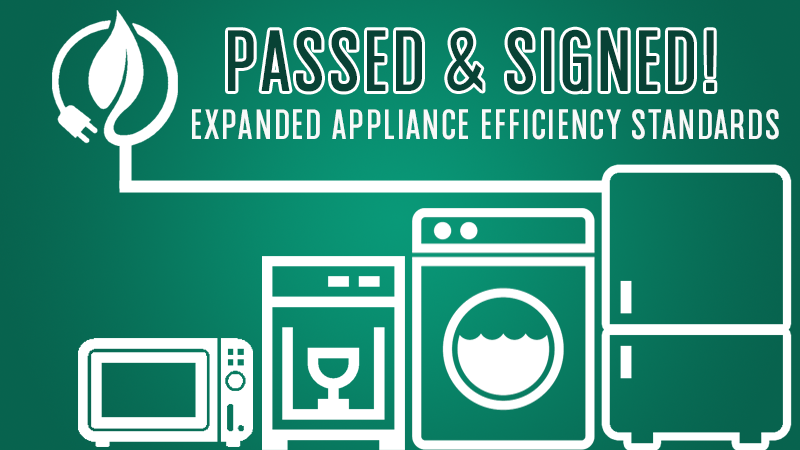On May 22nd, Gov. Scott signed H.410 – legislation that expands Vermont’s appliance efficiency standards. Gov. Scott listened to the voices of Vermonters, as well as the vast majority of the Vermont House of Representatives and State Senate, which passed the bill on tri-partisan votes of 137-4 and 25-4, respectively.
This law goes beyond current federal standards. It establishes efficiency standards for 16 appliance types not currently covered at the federal level, from air compressors and commercial dishwashers to computers and computer monitors. Taking these inefficient appliances out of the market is a significant move towards affordability. This will cumulatively save Vermonters $210 million by 2035 and from a carbon pollution standpoint, be equivalent to taking thousands of cars off the road.
Appliance efficiency standards set a minimum efficiency threshold for appliances and lightbulbs for your home or business, protecting consumers against the hidden “second price tag” of appliances: the cost of the energy needed to power those appliances over time. By setting a minimum threshold, these standards ensure that Vermont consumers are protected from the exorbitant energy bills that would have come along with the most inefficient products otherwise, saving everyone energy and money.
Nationally, appliance standards cover roughly 60 appliance types. These existing standards will save $2.4 trillion for U.S. consumers and businesses by 2030. In Vermont alone, consumers save about $555 each year on their energy bills thanks to appliance efficiency standards. For more on these efficiency standards, see our FAQ.
Using less energy and taking these additional inefficient appliances out of the market is a step not just towards sustainability, but one towards affordability as well. Efficient appliances are a cost effective way to meet both goals. Simply put, the cleanest and cheapest energy is the energy we don’t use.
H.410 expands Vermont appliance efficiency standards, building on H. 411 (Act 42 of 2017), which safeguards against the threat of roll-backs by the Trump Administration, guaranteeing that if federal standards go away, appliances sold in Vermont will still have to meet those same standards.
Not only is the combination of these new standards and H.411’s protection of current federal standards an important step towards our Comprehensive Energy Plan (CEP) goal of 90% renewable energy by 2050, these standards set a new bar for appliance efficiency nationally.
VPIRG is actively working with national partners and Vermont legislators to make sure that other states follow Vermont’s lead – and that these standards ultimately are adopted at the federal level. Several states, including Massachusetts and Rhode Island, are currently considering similar legislation.
Several other provisions were also added to H.410:
- The Administration will now have to issue an annual report on progress towards meeting Vermont’s 90% renewable energy goal.
- State regulators are tasked with two reports on the challenge of meeting renewable energy goals while also resolving grid constraints.
- State “no parking” laws are extended to spots which are reserved for electric vehicle (EV) parking, to make sure we’re making the best use of our public EV charging infrastructure.
These appliance efficiency standards are an important though modest step towards eliminating our dependence on fossil fuels. Thank you for helping make them possible.

